-
90 results in Exploration of Musculoskeletal DiseasesSort byMost Cited
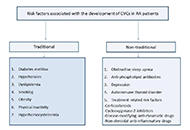 Rheumatoid arthritis and cardiovascular comorbiditiesOpen AccessReviewRheumatoid arthritis (RA) is the most common rheumatologic disease characterized by inflammation with a definite relationship with heart disease. Impaired immunity, chronic inflammation, genetic sus [...] Read more.Uğur Özkan ... Murat BirtanePublished: December 06, 2023 Explor Musculoskeletal Dis. 2023;1:264–288
Rheumatoid arthritis and cardiovascular comorbiditiesOpen AccessReviewRheumatoid arthritis (RA) is the most common rheumatologic disease characterized by inflammation with a definite relationship with heart disease. Impaired immunity, chronic inflammation, genetic sus [...] Read more.Uğur Özkan ... Murat BirtanePublished: December 06, 2023 Explor Musculoskeletal Dis. 2023;1:264–288
DOI: https://doi.org/10.37349/emd.2023.00028
This article belongs to the special issue Comorbidities in rheumatoid arthritis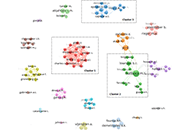 Work-related musculoskeletal disorders among surgeons: a bibliometric analysis from 1982 to 2024Open AccessReviewSurgeons are exposed to a high prevalence of work-related musculoskeletal disorders (WMSDs). The scientific issues surrounding this problem are generating a growing body of work. The aim of this stu [...] Read more.Philippe Gorce, Julien Jacquier-BretPublished: July 30, 2024 Explor Musculoskeletal Dis. 2024;2:317–335
Work-related musculoskeletal disorders among surgeons: a bibliometric analysis from 1982 to 2024Open AccessReviewSurgeons are exposed to a high prevalence of work-related musculoskeletal disorders (WMSDs). The scientific issues surrounding this problem are generating a growing body of work. The aim of this stu [...] Read more.Philippe Gorce, Julien Jacquier-BretPublished: July 30, 2024 Explor Musculoskeletal Dis. 2024;2:317–335
DOI: https://doi.org/10.37349/emd.2024.00059
This article belongs to the special issue Prevalence and Risk Factors of Work-related Musculoskeletal Disorders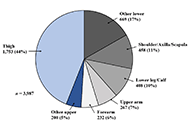 Soft tissue sarcoma: clinical recognition and approach to the loneliest cancerOpen AccessReviewSoft tissue sarcoma (STS) is a rare malignancy with a high incidence. Early diagnosis can reduce the rate of amputations and increase survival, however, this is typically delayed. The diagnosis and [...] Read more.Sujan Shakya ... Xiang ZhouPublished: February 06, 2024 Explor Musculoskeletal Dis. 2024;2:56–68
Soft tissue sarcoma: clinical recognition and approach to the loneliest cancerOpen AccessReviewSoft tissue sarcoma (STS) is a rare malignancy with a high incidence. Early diagnosis can reduce the rate of amputations and increase survival, however, this is typically delayed. The diagnosis and [...] Read more.Sujan Shakya ... Xiang ZhouPublished: February 06, 2024 Explor Musculoskeletal Dis. 2024;2:56–68
DOI: https://doi.org/10.37349/emd.2024.00034 Newborn hip screening experience in TürkiyeOpen AccessMini ReviewIn this review article, newborn hip screening experience in Türkiye was summarized. The nationwide newborn hip screening program was officially initiated in 2013. The program currently includes the [...] Read more.Hakan Ömeroğlu ... Feza KorkusuzPublished: February 18, 2024 Explor Musculoskeletal Dis. 2024;2:69–74
Newborn hip screening experience in TürkiyeOpen AccessMini ReviewIn this review article, newborn hip screening experience in Türkiye was summarized. The nationwide newborn hip screening program was officially initiated in 2013. The program currently includes the [...] Read more.Hakan Ömeroğlu ... Feza KorkusuzPublished: February 18, 2024 Explor Musculoskeletal Dis. 2024;2:69–74
DOI: https://doi.org/10.37349/emd.2024.00035
This article belongs to the special issue Baby Hip Sonography Worldwide: Experience, Results, and Recommendations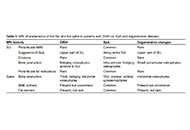 Is there a place for magnetic resonance imaging in diffuse idiopathic skeletal hyperostosis?Open AccessReviewDiffuse idiopathic skeletal hyperostosis (DISH) is a systemic condition characterized by the new bone formation and enthesopathies of the axial and peripheral skeleton. The diagnosis of DISH current [...] Read more.Iris EshedPublished: April 27, 2023 Explor Musculoskeletal Dis. 2023;1:43–53
Is there a place for magnetic resonance imaging in diffuse idiopathic skeletal hyperostosis?Open AccessReviewDiffuse idiopathic skeletal hyperostosis (DISH) is a systemic condition characterized by the new bone formation and enthesopathies of the axial and peripheral skeleton. The diagnosis of DISH current [...] Read more.Iris EshedPublished: April 27, 2023 Explor Musculoskeletal Dis. 2023;1:43–53
DOI: https://doi.org/10.37349/emd.2023.00008
This article belongs to the special issue Diffuse Idiopathic Skeletal Hyperostosis- A common but neglected disease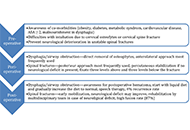 Perioperative management, operative techniques, and pitfalls in the surgical treatment of patients with diffuse idiopathic skeletal hyperostosis: a narrative reviewOpen AccessReviewDiffuse idiopathic skeletal hyperostosis (DISH) can lead to dysphagia, airway obstruction, and unstable vertebral fractures. Surgery can be performed to relieve cervical compression or stabilize fra [...] Read more.Netanja I. Harlianto ... Jorrit-Jan VerlaanPublished: August 29, 2023 Explor Musculoskeletal Dis. 2023;1:84–96
Perioperative management, operative techniques, and pitfalls in the surgical treatment of patients with diffuse idiopathic skeletal hyperostosis: a narrative reviewOpen AccessReviewDiffuse idiopathic skeletal hyperostosis (DISH) can lead to dysphagia, airway obstruction, and unstable vertebral fractures. Surgery can be performed to relieve cervical compression or stabilize fra [...] Read more.Netanja I. Harlianto ... Jorrit-Jan VerlaanPublished: August 29, 2023 Explor Musculoskeletal Dis. 2023;1:84–96
DOI: https://doi.org/10.37349/emd.2023.00013
This article belongs to the special issue Diffuse Idiopathic Skeletal Hyperostosis- A common but neglected disease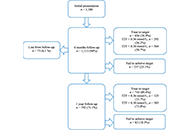 Real-life results of urate-driven pharmacotherapy with three urate lowering drugs in gout: allopurinol, febuxostat and benzbromaroneOpen AccessOriginal ArticleAim: This study aims to assess outcomes of gout patients from the treat to target (T2T) perspective at 6 months and 12 months while using urate lowering therapy (ULT): allopurinol, febuxostat, an [...] Read more.Ioana Hotea ... Tim L. JansenPublished: August 30, 2023 Explor Musculoskeletal Dis. 2023;1:97–105
Real-life results of urate-driven pharmacotherapy with three urate lowering drugs in gout: allopurinol, febuxostat and benzbromaroneOpen AccessOriginal ArticleAim: This study aims to assess outcomes of gout patients from the treat to target (T2T) perspective at 6 months and 12 months while using urate lowering therapy (ULT): allopurinol, febuxostat, an [...] Read more.Ioana Hotea ... Tim L. JansenPublished: August 30, 2023 Explor Musculoskeletal Dis. 2023;1:97–105
DOI: https://doi.org/10.37349/emd.2023.00014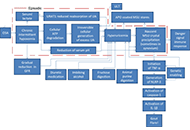 Premature mortality with gout and hyperuricemia may be reduced by early resolution of comorbid obstructive sleep apneaOpen AccessReviewHyperuricemia is known to be a necessary and causal condition for gout, but much more prevalent than gout. Medicine has standardized treatments for gout, but has no such determination for asymptomat [...] Read more.Burton AbramsPublished: August 31, 2023 Explor Musculoskeletal Dis. 2023;1:106–120
Premature mortality with gout and hyperuricemia may be reduced by early resolution of comorbid obstructive sleep apneaOpen AccessReviewHyperuricemia is known to be a necessary and causal condition for gout, but much more prevalent than gout. Medicine has standardized treatments for gout, but has no such determination for asymptomat [...] Read more.Burton AbramsPublished: August 31, 2023 Explor Musculoskeletal Dis. 2023;1:106–120
DOI: https://doi.org/10.37349/emd.2023.00015
This article belongs to the special issue Hyperuricemia current state and prospects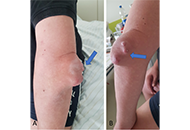 Similarities and differences between gouty arthritis and rheumatoid arthritis—an interesting case with a short look into the literatureOpen AccessCase ReportGout often presents as acute arthritis but may also present with chronic joint inflammation. For the diagnosis of an acute gout attack with its typical symptoms, the differentiation towards a bacter [...] Read more.David Kiefer ... Juergen BraunPublished: February 24, 2023 Explor Musculoskeletal Dis. 2023;1:11–19
Similarities and differences between gouty arthritis and rheumatoid arthritis—an interesting case with a short look into the literatureOpen AccessCase ReportGout often presents as acute arthritis but may also present with chronic joint inflammation. For the diagnosis of an acute gout attack with its typical symptoms, the differentiation towards a bacter [...] Read more.David Kiefer ... Juergen BraunPublished: February 24, 2023 Explor Musculoskeletal Dis. 2023;1:11–19
DOI: https://doi.org/10.37349/emd.2023.00003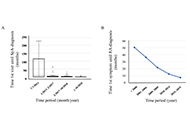 Opportunities of digital health technologies for rheumatology: from clinics to quality and researchOpen AccessPerspectiveRecent developments in digital health technologies are overwhelming, and their use in routine work is still difficult to anticipate. This narrative review summarizes the concept of consecutive cohor [...] Read more.Michael Schirmer ... Johannes D. PalluaPublished: April 08, 2024 Explor Musculoskeletal Dis. 2024;2:82–91
Opportunities of digital health technologies for rheumatology: from clinics to quality and researchOpen AccessPerspectiveRecent developments in digital health technologies are overwhelming, and their use in routine work is still difficult to anticipate. This narrative review summarizes the concept of consecutive cohor [...] Read more.Michael Schirmer ... Johannes D. PalluaPublished: April 08, 2024 Explor Musculoskeletal Dis. 2024;2:82–91
DOI: https://doi.org/10.37349/emd.2024.00037
This article belongs to the special issue Digital health technologies in rheumatology: emerging evidence and innovation Empowering rheumatology through digital health technologies: contributions and barriersOpen AccessPerspectiveRheumatology, the medical specialty dealing with the diagnosis and treatment of rheumatic and musculoskeletal diseases (RMDs), is evolving with the emergence of digital health technologies, such as [...] Read more.Diego Benavent ... Antonio Gómez-CentenoPublished: April 9, 2024 Explor Musculoskeletal Dis. 2024;2:92–105
Empowering rheumatology through digital health technologies: contributions and barriersOpen AccessPerspectiveRheumatology, the medical specialty dealing with the diagnosis and treatment of rheumatic and musculoskeletal diseases (RMDs), is evolving with the emergence of digital health technologies, such as [...] Read more.Diego Benavent ... Antonio Gómez-CentenoPublished: April 9, 2024 Explor Musculoskeletal Dis. 2024;2:92–105
DOI: https://doi.org/10.37349/emd.2024.00038
This article belongs to the special issue Digital health technologies in rheumatology: emerging evidence and innovation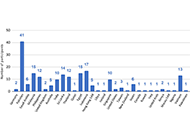 Teleteaching in paediatric rheumatology: an Asia Pacific League of Associations for Rheumatology experienceOpen AccessOriginal ArticleAim: To evaluate the reach and potential effectiveness of teleteaching of health providers in paediatric rheumatology by observing the pattern of sessions, attendance, and attendees’ feedback i [...] Read more.Sumaira Farman ... Saira Elaine Anwer KhanPublished: April 17, 2024 Explor Musculoskeletal Dis. 2024;2:133–144
Teleteaching in paediatric rheumatology: an Asia Pacific League of Associations for Rheumatology experienceOpen AccessOriginal ArticleAim: To evaluate the reach and potential effectiveness of teleteaching of health providers in paediatric rheumatology by observing the pattern of sessions, attendance, and attendees’ feedback i [...] Read more.Sumaira Farman ... Saira Elaine Anwer KhanPublished: April 17, 2024 Explor Musculoskeletal Dis. 2024;2:133–144
DOI: https://doi.org/10.37349/emd.2024.00042
This article belongs to the special issue Digital health technologies in rheumatology: emerging evidence and innovation The reality of sonography of the infant hip in Brazil: results and recommendationsOpen AccessReviewSince 1980, when Professor Reinhard Graf developed a novel technique, sonography of the infant hip has played a prominent role in the early diagnosis of developmental dysplasia of the hip (DDH). Bra [...] Read more.Giovanna Galvão Braga Motta ... Alexandre Francisco de LourençoPublished: May 20, 2024 Explor Musculoskeletal Dis. 2024;2:156–163
The reality of sonography of the infant hip in Brazil: results and recommendationsOpen AccessReviewSince 1980, when Professor Reinhard Graf developed a novel technique, sonography of the infant hip has played a prominent role in the early diagnosis of developmental dysplasia of the hip (DDH). Bra [...] Read more.Giovanna Galvão Braga Motta ... Alexandre Francisco de LourençoPublished: May 20, 2024 Explor Musculoskeletal Dis. 2024;2:156–163
DOI: https://doi.org/10.37349/emd.2024.00045
This article belongs to the special issue Baby Hip Sonography Worldwide: Experience, Results, and Recommendations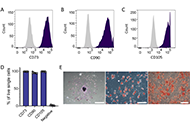 Mesenchymal stromal cells from people with osteoporosis are fewer, and defective in both osteogenic and adipogenic capacityOpen AccessOriginal ArticleAim: Osteoporosis (OP) is caused by imbalanced bone remodelling homeostasis. It is highly prevalent, especially in post-menopausal women, resulting in high risk of fracture and morbidity. Mesench [...] Read more.Féaron C. Cassidy ... Cynthia M. ColemanPublished: June 03, 2024 Explor Musculoskeletal Dis. 2024;2:164–180
Mesenchymal stromal cells from people with osteoporosis are fewer, and defective in both osteogenic and adipogenic capacityOpen AccessOriginal ArticleAim: Osteoporosis (OP) is caused by imbalanced bone remodelling homeostasis. It is highly prevalent, especially in post-menopausal women, resulting in high risk of fracture and morbidity. Mesench [...] Read more.Féaron C. Cassidy ... Cynthia M. ColemanPublished: June 03, 2024 Explor Musculoskeletal Dis. 2024;2:164–180
DOI: https://doi.org/10.37349/emd.2024.00046
This article belongs to the special issue Cell Therapy and Tissue Engineering for Musculoskeletal Conditions: From Pre-clinical Studies to Clinical Trials How to treat a patient with psoriatic arthritis and chronic lymphocytic leukemia?Open AccessCase ReportA 76-year-old male patient who has been suffering from psoriatic arthritis (PsA) for 15 years was diagnosed with chronic lymphocytic leukemia (CLL) 18 months ago. He has been treated him with a Brut [...] Read more.Jürgen Braun ... Denis PoddubnyyPublished: June 20, 2024 Explor Musculoskeletal Dis. 2024;2:235–241
How to treat a patient with psoriatic arthritis and chronic lymphocytic leukemia?Open AccessCase ReportA 76-year-old male patient who has been suffering from psoriatic arthritis (PsA) for 15 years was diagnosed with chronic lymphocytic leukemia (CLL) 18 months ago. He has been treated him with a Brut [...] Read more.Jürgen Braun ... Denis PoddubnyyPublished: June 20, 2024 Explor Musculoskeletal Dis. 2024;2:235–241
DOI: https://doi.org/10.37349/emd.2024.00051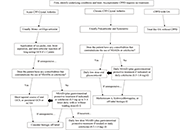 Treatment strategies for calcium pyrophosphate deposition diseaseOpen AccessReviewCalcium pyrophosphate deposition disease (CPPD) is a cause of inflammatory arthropathy that increases in prevalence with increasing age, presents in acute and chronic forms, and is characterized by [...] Read more.Anna J. Turlej, Angelo L. GaffoPublished: July 19, 2024 Explor Musculoskeletal Dis. 2024;2:279–292
Treatment strategies for calcium pyrophosphate deposition diseaseOpen AccessReviewCalcium pyrophosphate deposition disease (CPPD) is a cause of inflammatory arthropathy that increases in prevalence with increasing age, presents in acute and chronic forms, and is characterized by [...] Read more.Anna J. Turlej, Angelo L. GaffoPublished: July 19, 2024 Explor Musculoskeletal Dis. 2024;2:279–292
DOI: https://doi.org/10.37349/emd.2024.00056
This article belongs to the special issue Calcium Pyrophosphate Deposition Disease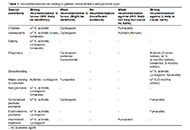 How should we do in the selection and follow-up of systemic conventional treatments in psoriasis?Open AccessReviewThere is an increasing need for appropriate effective treatment and long-term disease control in patients with psoriasis because of the decreased quality of life, increased physicosocial deficits an [...] Read more.Sevgi AkarsuPublished: December 05, 2023 Explor Musculoskeletal Dis. 2023;1:241–256
How should we do in the selection and follow-up of systemic conventional treatments in psoriasis?Open AccessReviewThere is an increasing need for appropriate effective treatment and long-term disease control in patients with psoriasis because of the decreased quality of life, increased physicosocial deficits an [...] Read more.Sevgi AkarsuPublished: December 05, 2023 Explor Musculoskeletal Dis. 2023;1:241–256
DOI: https://doi.org/10.37349/emd.2023.00026
This article belongs to the special issue Psoriatic disease: from the skin to the musculoskeletal system and beyond Calcium pyrophosphate crystal deposition disease—what’s new?Open AccessEditorialJürgen BraunPublished: December 06, 2023 Explor Musculoskeletal Dis. 2023;1:257–263
Calcium pyrophosphate crystal deposition disease—what’s new?Open AccessEditorialJürgen BraunPublished: December 06, 2023 Explor Musculoskeletal Dis. 2023;1:257–263
DOI: https://doi.org/10.37349/emd.2023.00027
This article belongs to the special issue Calcium Pyrophosphate Deposition Disease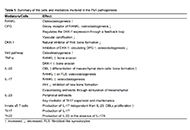 Psoriasis, bone and bowel: a comprehensive review and new insightsOpen AccessReviewPsoriasis is a chronic immune-mediated disorder affecting about 2% of the population worldwide which is associated with significant morbidity. The disease usually presents as raised, well-demarcated [...] Read more.Fakhreddin SaboonihaPublished: January 18, 2024 Explor Musculoskeletal Dis. 2024;2:1–19
Psoriasis, bone and bowel: a comprehensive review and new insightsOpen AccessReviewPsoriasis is a chronic immune-mediated disorder affecting about 2% of the population worldwide which is associated with significant morbidity. The disease usually presents as raised, well-demarcated [...] Read more.Fakhreddin SaboonihaPublished: January 18, 2024 Explor Musculoskeletal Dis. 2024;2:1–19
DOI: https://doi.org/10.37349/emd.2024.00029
This article belongs to the special issue Psoriatic disease: from the skin to the musculoskeletal system and beyond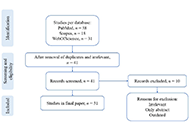 Scoping review on remote disease monitoring in rheumatoid arthritis: does it actually help the patient?Open AccessReviewRemote monitoring technologies (RMTs) are an emerging tool for assessing, monitoring, and following up on patients with chronic diseases including autoimmune rheumatic diseases (AIRDs). The best use [...] Read more.Prakashini Mruthyunjaya ... Debashish DandaPublished: January 22, 2024 Explor Musculoskeletal Dis. 2024;2:20–30
Scoping review on remote disease monitoring in rheumatoid arthritis: does it actually help the patient?Open AccessReviewRemote monitoring technologies (RMTs) are an emerging tool for assessing, monitoring, and following up on patients with chronic diseases including autoimmune rheumatic diseases (AIRDs). The best use [...] Read more.Prakashini Mruthyunjaya ... Debashish DandaPublished: January 22, 2024 Explor Musculoskeletal Dis. 2024;2:20–30
DOI: https://doi.org/10.37349/emd.2024.00030
This article belongs to the special issue Digital health technologies in rheumatology: emerging evidence and innovation -
